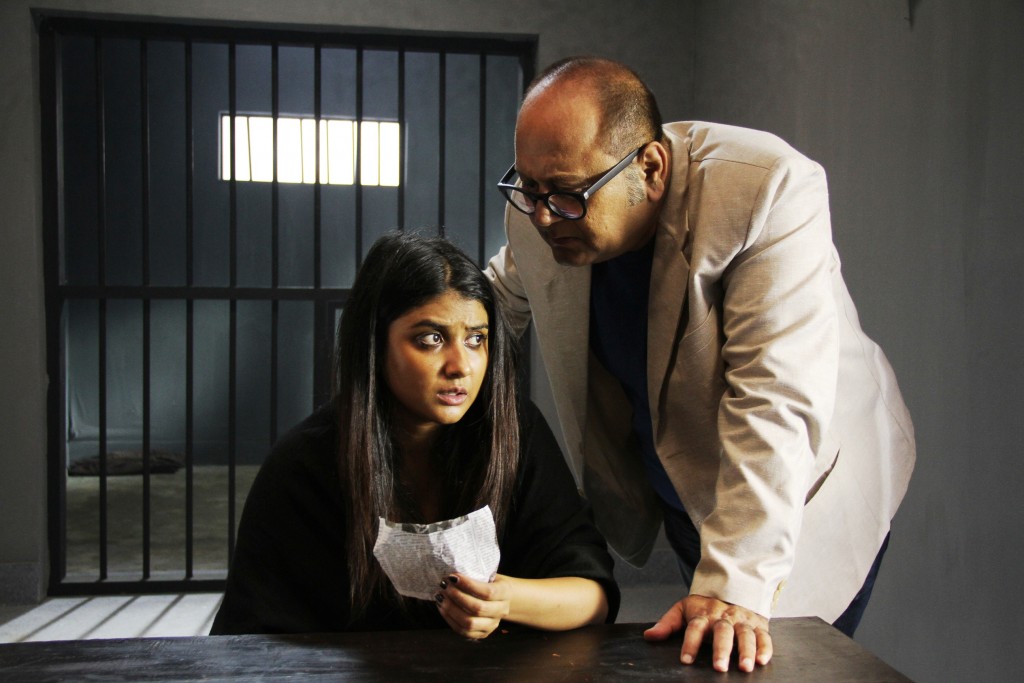Debutant Tathagata Banerjee says his film Sesh Anka is a thriller. Is it? It is in the sense that the story opens with a reported murder of the mysterious Antony D’Costa (Tathagata Banerjee) in a hotel room followed by the arrest of the young Raina Roy Choudhury (Parno Mitra), a drug addict accused of the murder. D’Costa is said to be a king of the underworld who keeps changing his name and his identity as he flits and floats across spaces and places. Raina is publicly disowned by her father industrialist Ritobrata Roy Choudhury (Shankar Chakraborty) who is too busy leading a lurid life with his ‘partner’, Meenakshi Bhattacharya (Debolina Dutta), to pay attention to his gone-wrong daughter.
From this point on, however, the narrative goes haywire held up somehow by the sterling performance of Dipankar Dey as Pronoy Dasgupta the defence lawyer dug out from retirement by Amrita Banerjee (June Mallia), wife of television producer Alokesh Banerjee (Arindam Sil), to defend the helpless and defenseless Raina. Amrita and Alokesh have recently lost their only daughter Payal (Rini Ghosh) who died in a car crash and now become surrogate parents to Raina. The script meanders across hills and valleys of a topsy turvy script in which Raina has little else to do but look forlorn and sad and helpless with a rationale for her having gone wrong! Some logic!
From time to time, a man pops up from nowhere in strange disguises to help Pronoy Dasgupta and this character forms part of the mystique of the film. As it turns out, he is John Braganza (Mir Afsar Ali) who is a journalist out to help Dasgupta. However, how he manages to follow up on a single story through the entire film and why he pops up in strange disguises just to help Pronoy solve the mystery of the murder unintentionally becomes a main point of suspense in the film, albeit a suspense that neither thrills nor amuses but after a point, tends to irritate. Shankar Chakraborty is very good as the industrialist who his daughter turns away from in the end when she is proved innocent and the real killer is caught.
The mystery that is supposed to unravel itself layer by slow layer gets trapped in a tangle of characters and incidents that are sort of forcibly imposed on the story. One example is the character of the hotel owner Rajeev Mitra (Shataf Figar) who is revealed to be having a torrid and clandestine affair with the seductive Meenakshi who is a two-timer who overdoes her slow and sexy drawl right till the courtroom. The red herrings are clever but needed to be handled with dexterity that is absent here. The director deserves kudos for giving Samadarshi Dutta a completely new overhaul in his screen image as the no-nonsense, angry but honest police officer Prithivraj in the film. Samadarshi does justice to both the image and the character.
There is no attempt on the part of the director or the script to broaden the concept of the city in the labyrinthine lanes of which the characters live and work and the murder takes place. Just the killing of a mafia lord cannot create spine-chilling suspense unless the character is fleshed out properly not by a fond-of-disguises-and-stunts journalist but by the script itself. There is no dispersion of menace, no scenes that create panic and fear is almost non-existent. The double world of the thriller metropolis – ordinary and humdrum on the one hand and adventurous on the other has not been explored though the story offered the scope and space for this exploration. There is no juxtaposition between the familiar and the sinister because nothing and no one in the film is really ‘familiar’ and nor is there anything remotely resembling what one understands by ‘sinister.’
The background score is so loud in the beginning that the dialogues get drowned. Usha Uthup’s solo number is an imposition but a good one in this otherwise songless film. Arindam Sil as Ritabrato’s close friend who turns against him for disowning his own daughter is low-key and subtle till the last courtroom scene where the script goes haywire and turns into melodrama. The cinematography is extremely dark in the beginning though whether this is a projection fault at Nandan I no one knows. The editing is jarry and haphazard but that is mainly the defect of the script that loses its grip after a point. The best part of the film lies in its acting though Parno is thoroughly wasted in what is supposed to be the lead role.
Sesh Anka is extremely dialogue-centric and verbose which takes away from the element of suspense and chills created and sustained through other elements like ominous silence heightened by sinister and intriguing sound effects on the acoustic map and also, a lot of cutting edge action that can often be manipulated through clever and diabolic editing. The courtroom scenes are not only dragging and amateurish but also factually lacking. For example, how can the defence lawyer question two people at the same time – one in dock and the other standing on a raised platform on the opposite side? The element of expectation – what will happen next – is missing. “Who committed the murder?” is well-dispersed among different characters who become suspects as the narrative unfolds. That is one strong point in favour of the film. But in the ultimate analysis, things get messed up when the film steps into the courtroom. The labyrinth that suspense can create is sadly missing not only in Shesh Anko but in most other Bengali films that pride in calling themselves thrillers. Wait Until Dark anyone? Or, Silence of the Lambs, or Psycho?
Bengali, Thriller, Color


